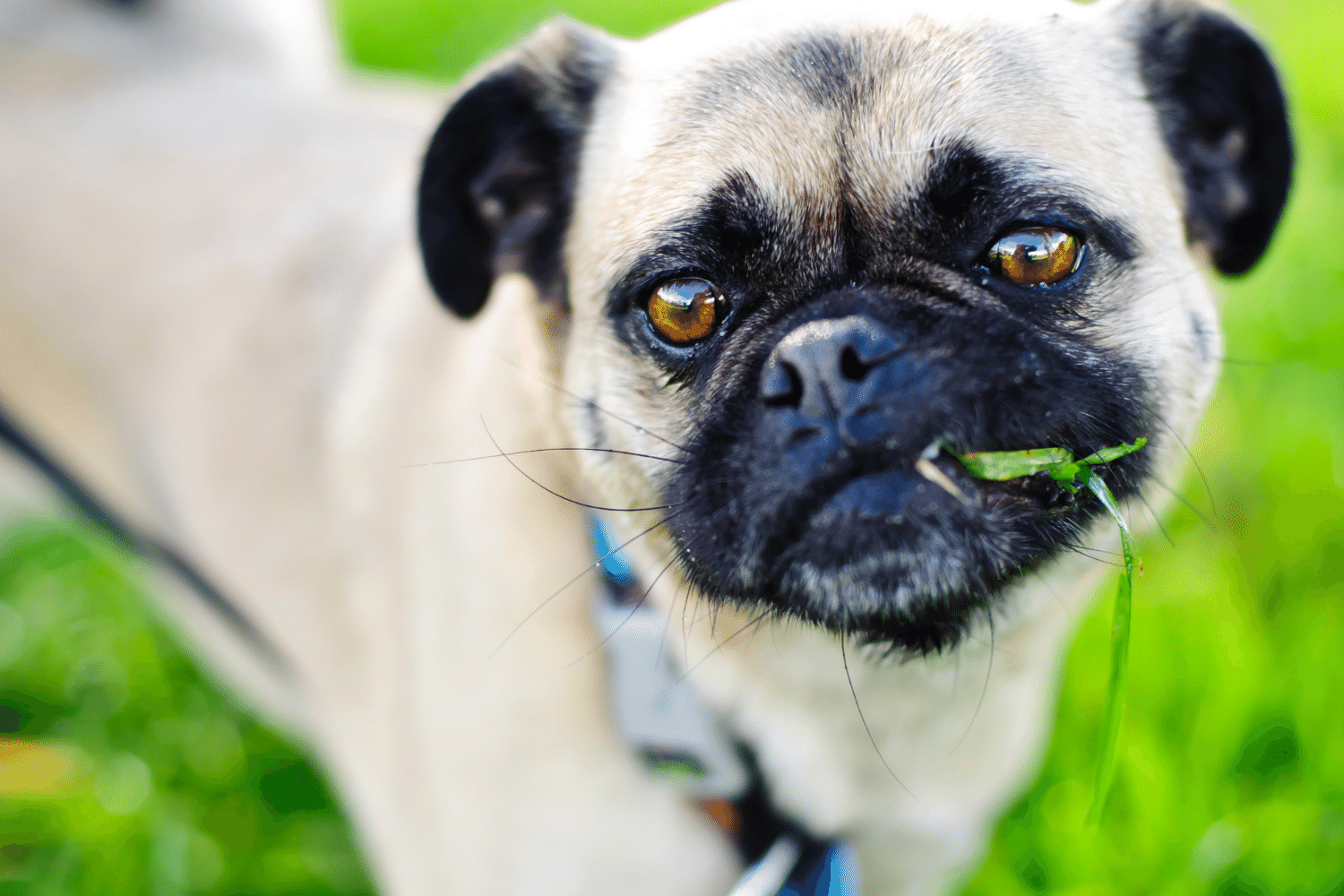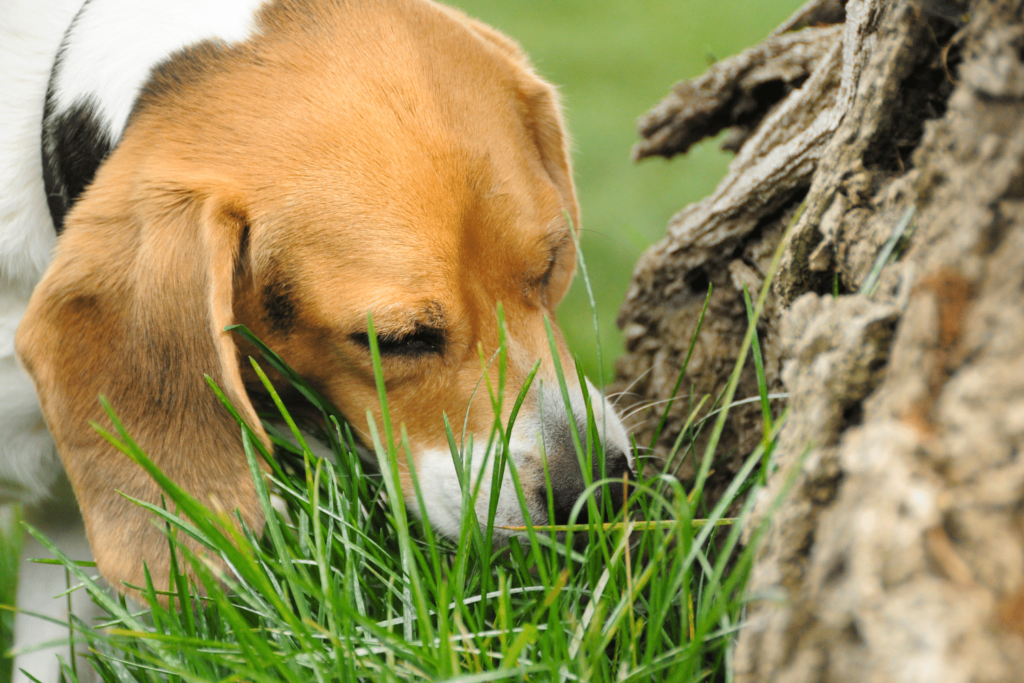
Are you worried about why do dogs eat grass and vomits? Probably you have spotted your dog eating grass and throwing it later on. You aren’t alone.
According to research, over 79% of dog parents have found their dog eating grass and plants. And among these, nearly 68% ate grass daily or weekly. At the same time, among these dogs, only 22% vomited after eating the grass, and 9% of them showed signs of illness.
If you see your pooch munching on grass, you may become concerned, and this may make you wonder why they’re doing so. In this article, you will learn about potential reasons why your dog eats grass and vomits and why you should sometimes let your dog engage in what seems like bizarre stuff.
Besides this, we’ll also evaluate the validity of the most publicized reasons behind dogs’ weird behavior of eating grass and explain if they matter? Stick to this page for 10 mins only. Here we come.
Contents
Why Dogs Eat Grass: Primary Reasons
The main reason behind this is possibly Pica, a condition in which dogs eat items that aren’t food, but there are other possibilities too, such as malnourishment.
Malnourished dogs may act out and consume non-edible items that do not make sense. Grass-eating is a typical occurrence in dogs and is deemed acceptable. It likely tastes sweet when a dog eats grass (thanks to its sugar), but genuine dog food or cans might taste overly salty or boring.
Young dogs of 5- to 7-weeks are more likely to eat grass than senior canines if their mother had also been eating grass. It might be an evolutionary trait or innate behavior passed down the generations to assist wild canines in finding food or meet dietary needs when nothing else is available in their surroundings.
Some Common Reasons Why Dogs Eat Grass: VALID or NOT?

Grazing
The reason behind the action of your dog could be that they like the flavor of the grass. Surprisingly, the grass seems to taste pleasing to dogs, even though they prefer meat over salad! It’s possible that they’re lacking a key nutrient, as some veterinarians say, or that it tastes so nice that they forget about their usual food.
Your dog may have a psychological need for this type of activity. For instance, a dog that doesn’t communicate his sentiments could munch grass to demonstrate he’s worried over stuff. It makes it simpler for you to comprehend what your furry companion wants!
So, the reason is pretty justified, as we talked about a study that tells how puppies tend to like eating grass if their mother has been eating it.
Instinctive Behavior
Although the exact cause for this habit is uncertain, there are many theories about why dogs chew grass and vomit. One explanation is that dogs eat grass to get rid of hairballs that get out of their grooming habit or eat their prey, just like other carnivores.
Yet, there is no evidence as to whether dogs eat grass to get rid of hairballs that can develop in their digestive tract due to preying. However, a study on snow leopards shows that it might be true for leopards. Dogs are carnivores, which can also be true for them.
That being said, dogs don’t love to groom themselves as cats do, and they’re also not obligate carnivores. So the chances are fewer that the dogs can have hairballs.
Proposed Psychological Reasons Why Dogs Eat Grass and Their Validity
There can also be many psychological reasons behind this habit of your dog eating grass and then vomiting. And after good research, we have found a few factors that can influence your dogs to eat grass.
Eating Grass Out of Boredom. Not much Distressing
Dogs are creatures who love playful activities, and if they’re not regularly given lots of exercises or mental stimulation, they’ll soon become bored. It’s beneficial for them to eat grass since it helps them relax. So, when your dogs need a change of pace, they may chew grass—especially if you aren’t present.
Stress or Excitement Can Influence to Eat Grass: MAY BE!
When dogs are nervous or anxious, they might chew grass for various reasons, including separation anxiety. Spending more time with your dog can help to reduce the negative impacts of stress and anxiety on your pet.
You may help them feel better by putting food or a toy stuffed with goodies at home until you return from work or until you return to wherever you left them.
But it can be out of excitement too! Dogs spend a lot of time indoors, outdoors, or meeting others. They can become excited and drawn to grass, as somebody commented on YouTube.
Dogs See Grass as a Food Source
If you ever witness your dog eating grass, you might be startled. Chewing on grass is a favorite pastime for dogs.
The grass is tasty since it isn’t as crunchy as kibble or canned food, and it isn’t pre-chewed for your dog like rawhide (which can be quite dangerous for little puppies). Dogs appreciate the taste of grass because it is an acquired taste, and they think of it as food, but they don’t really know how two types of grass are different. According to research conducted at the University of England, dogs take grass as a food source without caring about its type.
So, dogs also tend to slurp food down rapidly and scrape anything that drops from their bowls or plates with their tongue.
Physical Reasons Why Dogs Eat Grass
Along with psychological reasons, there can also be many physical reasons for your dog eating grass and throwing up. We have mentioned some physical reasons for this odd behavior of your dog for your better understanding.
Dogs Eat Grass out of Nutritional Deficiency: Most Propagated Reason But How Far True
“A blade of grass a day keeps the vet away.”
~Unknown Dog
It’s common to hear that if your dog is eating grass, it might indicate that it isn’t receiving enough vitamins or is having trouble with the texture of its food. The reason only seems to be to show grass eating as a normal behavior followed by medical advice. There is only one case study here to tell us that a 11-year-old dog’s 7 years grass-eating habit was corrected with the help of a high fiber diet.
But, it’s only one case study.
To you, it might seem acceptable, for it’ll not harm your dog, assuming that they need better nutrition. Some folks talk about how their dogs missed the “greens” in their diet and loved to eat it in some way.
In contrast to above mentioned common notions, another Alfalfa Study confirmed that all dogs, without any diet particularities, eat grass when it’s available. So, when it’s about research, the dogs might be eating grass because they have can have it, simply!
Dogs Eating Grass due to Upset Stomach and Need Probiotics: Yes, Believable.
Dogs eat grass when they have an upset stomach or have an upset stomach after eating it?
The egg and chicken story has become clear now!
A recent FOS study confirms that dogs would less likely eat grass when fed on probiotics. Another study indicates that chlorophyll helps detoxify the digestive tract in dogs and thus promotes better health. So, guided by nature, the dogs might eat grass — they aren’t veterinarians themselves, though.
BUT WHAT ABOUT DOGS EATING GRASS AND THROWING IT??
However, evidence to back up the assertion that dogs didn’t eat grass to make themselves sick has been difficult to come by. According to this web-based survey, the dogs who eat grass, among them the young, were large in number, and they also didn’t vomit too frequently compared to the older dogs. In Addition, 8% of the dogs who ate grass had some signs of illness before eating grass. So, we can conclude:
- The dogs who eat grass probably have some illness in their gastrointestinal stress, whether diagnosed or not.
- The old dogs can vomit more frequently, which means aging causes poor digestion to compel the eaten food out.
- Grass eating isn’t about an upset stomach causing dogs to eat green, but when it’s followed by vomiting or sickness, it indicates a digestion problem.
Note: All these dogs were being fed upon a fortified commercial diet by their owners and not upon any raw, homemade, or table food.
Strategies to Prevent Your Dog From Eating Grass
If your dog’s lawn habits are causing you concern, a few things you can be helpful. Perhaps there is a problem with its dietary habits.
If you believe this is the fact, make changes to their diet, e.g., adding:
- Spinach
- Kale
- Broccoli
- Cabbage
Parsley in their diets to help them get enough chlorophyll. And, don’t punish them if you spot them eating grass, and don’t panic if they vomit sometimes.
Make them comfortable in new foods, since this might disturb their stomach. In this circumstance, you should seek guidance from a veterinarian on the best meals for dogs.
it’s critical to be aware of your dog’s health. So, consider whether they’re attempting to self-treat specific ailments or issues if you find them grazing on the lawn more frequently or in larger amounts than normal.
In addition, keep an eye out for vomiting, diarrhea, weight loss, a loss of appetite or interest in eating, blood in the stool, drowsiness, and lip licking/drooling. These might be signs of poisoning or another serious condition they are experiencing right now.
It is preferable to call a veterinarian if you fear your dog has bitten a hazardous plant or has consumed too much grass or pesticides. A veterinarian will normally take feces samples, run blood tests, and do physical examinations to detect underlying issues.
Keep your dog hydrated if he doesn’t show signs of consumption, but you suspect he’s had too much grass and wishes to counteract any negative effects or return him to his pre-consumption state. Also, wait 8-12 hours before reintroducing solid meals to his system.
Accept that grass poisoning is true after 12 hours and take your dog to the doctor right away for treatment.
Tips To Settle A Dog’s Upset Stomach After Eating Grass
If your dogs are eating grass followed by vomiting and you’re worried they’re using it as a substitute for Pepto-Bismol, try the following:
- Withhold food for 12-24 hours.
- Keep them hydrated using various beverages such as water mixed with a little lemon juice along with other fluids.
- Take them out for lots of bathroom breaks.
- You can also use a variety of alternatives to standard treatment, including plain yogurt, daily probiotics, pumpkin, oats, and bananas, all of which have been mentioned as effective home cures by pet owners worldwide.
After you’ve completed these measures, offer them a bland meal of boiled chicken and white rice for two days before gradually reintroducing their regular foods.
To avoid any unpleasant surprises, double-check with your veterinarian that any OTC “human” drugs are okay for your dog before giving them an overdose. Certain medicines may even kill dogs, which is why you should always have a backup plan in place in case something goes wrong, and you need to act responsibly on behalf of your dog.
However, here are a few symptoms after this you need a veterinarian:
- Dehydration. Check if your dog has severe dehydration symptoms, including dry, pale gums.
- Hard belly.
- Retching, vomiting, trying to vomit, or difficulty defecating.
- Blood in vomit, urine, or feces.
- Lethargy.
- Diarrhea.
- Ingestion of chemicals, poisons, medications, toxic foods, and foreign objects.
Beware, munching on grass might result in severe sickness if you don’t check your dog’s health after the grass-eating sessions. You should ensure that they aren’t harming themselves by chewing on pesticides or chemical-treated ground.
FAQS about your Dog Eats Grass and Throws it
Do dogs eat grass as a diet?
Dogs can vomit for several causes, but not for vomiting purposes. Studies have concluded that the more they eat the grass, the less they have been observed to vomit. Infections of the gastrointestinal system, food changes made too soon, food sensitivity, dietary indiscretion, and other serious gastrointestinal illnesses are common reasons.
Is eating grass a sign that your dog is sick?
Many individuals believe that their dogs munching grass is alarming, but this is rarely the case. In contrast, some dogs may be chewing grass to induce vomiting.
They may experience nausea, puking, and stomach cramps when consuming grass in large quantities. It is also practically observed by some pet parents that their dogs eat grass when they do not feel healthy. Or they vomit the grass when they already have a stomach disorder, lack adaptation for grass. For example, according to the research, those who ate grass frequently were better at digesting it, and those who couldn’t have existing digestion issues.
If your dog exhibits these symptoms only sometimes or intermittently, talking to your doctor about it can be beneficial. You would want to terminate the reasons that make your dog feel the need to make himself sick.
Do dogs cherish the taste of grass?
We don’t believe dogs chew grass to relieve stomach pain. When dogs run outdoors and lay on the lawn with their jaws open, we’ve seen it before. Dogs consume things that make many pets sick, which leaves you wondering how they don’t become sick when they ingest dangerous plants or chemicals.
The first thing we’d like to mention is that this is a constantly growing scientific issue, and there are a variety of ideas as to why the dog doesn’t get upset every time he eats a handful of geraniums.
How long is it safe for dogs to eat grass?
If your canine has always refused to eat grass, it suggests they aren’t used to eating human products and tend to eat anything they want as long as it’s edible.
But if you are concerned that eating grass will impact your dog’s overall health. Don’t worry, as this might not be the case because the grass is high in probiotics and promotes digestion.
Does eating grass mean a dog has worms?
No, eating grass and throwing it doesn’t always mean that your dog has worms. The stool analysis in the lab can help your veteran diagnose your grass-eating dog with worms.
Such medical conditions, including Pica, can cause your grass-eating dog to vomit frequently, have diarrhea, weight loss, and lethargy.
So, Should You Let Your Dog Eat Grass? Final Thoughts
Dogs eat grass for they can and vomit it when they fail to digest it because of some issues which are already prevailing if observed. You only need to be concerned if they eat grass but do not eat their food, vomit too frequently, or you think that grass can be pesticides and fertilizers loaded and unsafe for your dog.
In case of severity and illness, the only best thing you can do to them is visiting the vet. Dogs usually don’t get afraid of vets like cats, but if they react to you taking them to the vet on Sunday evening, just let them bark. After all, you can’t let them face troubles all alone.
doglover.biz is a participant in the Amazon Associate program and will earn from qualifying purchases.


